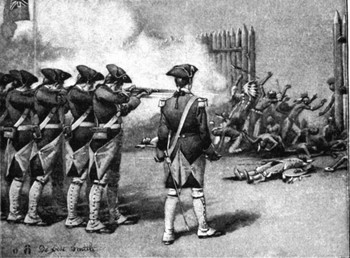When the term “genocide” is uttered in mainstream school environments, it usually refers to the Jewish Holocaust, or to other genocides committed in the 20th century: Turkey, Stalin’s Russia, Nanking, Cambodia, Rwanda, Bosnia-Herzegovina. But in many US classrooms, the United States is left out of the list of countries where genocide has occurred. And so, when the College Board decided in 2012 (1) that high school students taking Advanced Placement US history should learn about the American Indian genocide – and other events in our history that do not support the notion that ours is a country where peace, justice and the so-called “American way” have always prevailed – the uproar could be heard from Texas to Georgia, and Colorado to North Carolina.
The Republican National Committee passed a resolution in August 2014 asking for a congressional investigation into the AP US history framework and exam, stating, “The Framework [curriculum of what students should learn in AP US history courses] presents a biased and inaccurate view of many important events in American history, including the motivations and actions of 17th – 19th century settlers.”

